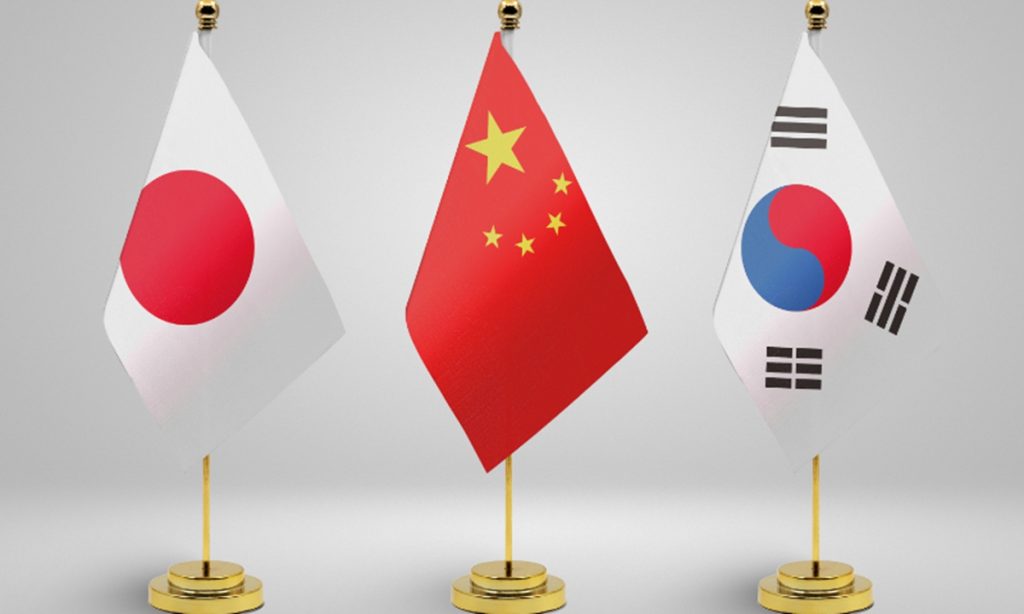GT Voice: Eliminating external influence key to restoring China-Japan-South Korea trilateral cooperation

South Korea has sought "active cooperation" from the US to resolve uncertainties regarding the upcoming expiry of a year-long waiver that allowed South Korean chipmakers to import US chip-making equipment for their production facilities in China, according to Reuters.
The development highlights the awkward situation faced by South Korea in terms of industrial chain and trade cooperation under US export controls. There is no denying that South Korea's industrial and trade policies have been subject to US influence and pressure, but the country's recent economic woes have made it clear that its cooperation with the US on certain industrial and technological restrictions against China could have serious consequences for its own economy.
There is growing recognition that economic and trade cooperation between China and South Korea must seek new opportunities and potential to offset the impact of US interference, otherwise it will be hard for the South Korean economy to escape its current predicament.
Given the shocks the US "decoupling" push has brought to regional trade and supply chain cooperation, the need to avoid cooperation from being hijacked by external forces applies not only to South Korea, but also to the entire East Asian economy.
It is against such a backdrop that senior diplomats from China, South Korea and Japan agreed on Tuesday to maintain communication on holding a leaders' meeting at the earliest opportunity convenient to all three countries.
Chinese Foreign Ministry Spokesperson Wang Wenbin said on Tuesday at a regular news briefing that the three countries unanimously believe that carrying out cooperation is in the common interests of the three parties, and they should work together to strengthen practical cooperation in the fields of the people-to-people exchanges, the economy and trade, scientific and technological innovation, sustainable development and public health, among others, to make new progress in trilateral cooperation and new contributions to regional peace, stability and prosperity.
The development certainly sends a positive signal for the trilateral cooperation mechanism. If anything, the potential restart of trilateral high-level meetings will have a positive impact on economic cooperation and political mutual trust among the three sides.
After years of development, China, Japan and South Korea have formed relatively stable industrial chain and supply chain cooperation, which many see may have the potential to play a more important role in Asian economic integration and even the world economy.
Unfortunately, the momentum of deepening cooperation among the three countries has been disrupted by external forces in recent years. In order to contain China's development, the US has roped in Japan and South Korea to promote its "decoupling" push from China.
Moreover, South Korea and Japan have been aligning themselves with the US on a range of economic and security issues, escalating tensions in East Asia and creating obstacles and uncertainties for regional economic cooperation. Under these circumstances, China-Japan-South Korea economic and trade cooperation is at its lowest point in years, with no winner in the regional supply chain disruption.
For instance, South Korea's exports fell 8.4 percent year-on-year to $51.87 billion in August, marking the 11th consecutive month that exports fell on an annual basis, the longest period since January 2020.
The most urgent task facing the three countries is to stabilize supply chains and prevent regional economic exchanges from being driven by external forces to a deadlocked stalemate.
To reboot the trilateral cooperation momentum, political sincerity to minimize external interference is crucial.
There is no doubt that China, Japan and South Korea have the economic basis of cooperation, and the biggest obstacle is from the geopolitical level, not economic one. Since the US pressure to break the chain may persist for a long time, if the three Asian countries want to stabilize cooperation, they must reach a consensus on how to strengthen internal cooperation, promote regional integration, and strengthen diplomatic coordination and other means to enhance the independence and sustainability of trilateral cooperation.
China, Japan and South Korea are important countries in East Asia, and to cope with challenges in the region, they need to join hands. If they cannot reject the influence of external factors or if they can be easily derailed from the trilateral cooperation track, the peaceful develo